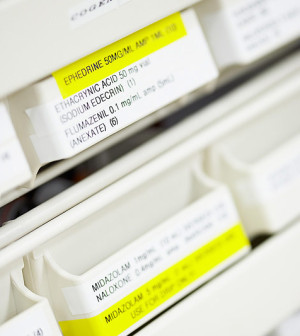- Could Your Grocery Store Meat Be Causing Recurring UTIs?
- Are You Making This Expensive Thermostat Error This Winter?
- Recognizing the Signs of Hypothyroidism
- 10 Strategies to Overcome Insomnia
- Could Artificial Sweeteners Be Aging the Brain Faster?
- Techniques for Soothing Your Nervous System
- Does the Water in Your House Smell Funny? Here’s Why
- Can a Daily Dose of Apple Cider Vinegar Actually Aid Weight Loss?
- 6 Health Beverages That Can Actually Spike Your Blood Sugar
- Treatment Options for Social Anxiety Disorder
Heart Medication Digoxin Linked to Higher Risk of Death for Some


Digoxin, a drug that’s been used to treat heart problems for about 200 years, might increase the risk of dying in certain patients.
New research suggests that for people who have a particular type of irregular heart rhythm, called atrial fibrillation, taking the drug digoxin may increase the risk of dying by more than 20 percent.
“We found in 122,000 patients with atrial fibrillation, those treated with digoxin were more likely to die [during the study period] than patients prescribed other medications,” said lead researcher Dr. Mintu Turakhia, an assistant professor of cardiology at Stanford University School of Medicine in Palo Alto, Calif.
Although the current research found an association between the drug digoxin and a higher risk of death for people with atrial fibrillation or flutter, the study does not show that the drug caused the higher risk of death.
However, Turakhia thinks the risk may be the result of digoxin causing other dangerous abnormal heart rhythms.
“Even though you are being given a drug to slow down your heart rate in atrial fibrillation, it may be causing other problems with your heart that may increase the risk of death,” he said.
Digoxin is made from extracts of the foxglove plant, also called digitalis. It has long been a standard treatment for atrial fibrillation, according to background information in the study.
Given that there are other treatments for atrial fibrillation, Turakhia wonders why digoxin should be the treatment of choice for these patients. “There are other safer drugs out there,” he said.
Safer alternatives may include drugs known as beta-blockers or calcium channel blockers, Turakhia said. “These have never been tied to an increased risk of death or major concerns with safety,” he said.
Turakhia thinks patients taking digoxin for atrial fibrillation should talk with their doctor about possibly switching to another medication.
“There may be a role for digoxin, but is it the right drug when there are other alternatives — that’s a discussion that may be worth having,” he said.
Turakhia said that digoxin might benefit some patients. “Recent studies have shown that digoxin might keep people with heart failure out of the hospital,” he said. “But most patients with atrial fibrillation don’t have heart failure,” he added.
The report was published online Aug. 11 in the Journal of the American College of Cardiology.
Dr. Gregg Fonarow, a professor of cardiology at the University of California, Los Angeles, said, “Although digoxin has been used for decades to treat patients with atrial fibrillation, there has been very limited clinical trial data, and its safety and effectiveness for atrial fibrillation remains controversial.”
Although a number of studies have suggested that digoxin may be associated with an increased risk of dying, the findings of these studies may be biased because digoxin is more likely used to treat patients with severe heart failure and for patients who cannot take beta-blockers or calcium channel blockers, he said.
The findings from this current study are also not definitive and raise more questions than they answer, Fonarow said. He thinks that clinical trials pitting digoxin against other treatments for atrial fibrillation are needed to settle the question.
In the meantime, Fonarow said, “patients with atrial fibrillation should not alter their medications without speaking to their cardiologist and carefully weighing the risks and benefits of the different treatment options.”
For the study, Turakhia and colleagues used medical records from the U.S. Department of Veterans Affairs health care system between 2003 and 2008. They collected data on more than 120,000 people with newly diagnosed atrial fibrillation. Nearly all of them were men.
Nearly one-quarter of them were taking digoxin. Seventy percent of those taking the drug were still taking it after a year, the researchers noted.
Turakhia’s team found that those taking digoxin were more than 20 percent more likely to die, compared with patients taking other drugs to control their atrial fibrillation.
The researcher took into account other factors, such as taking other drugs including beta-blockers, the heart rhythm drug amiodarone and the blood thinner warfarin. They also considered age and other medical conditions, such as kidney disease, heart attack or heart failure. However, the risk of death linked to digoxin remained the same, according to the study.
More information
For more about atrial fibrillation, visit the American Heart Association.
Source: HealthDay
Copyright © 2026 HealthDay. All rights reserved.










